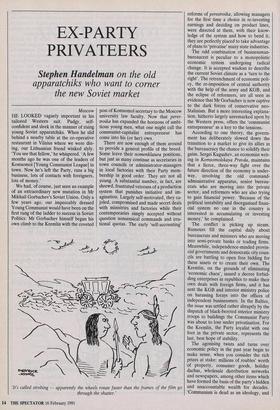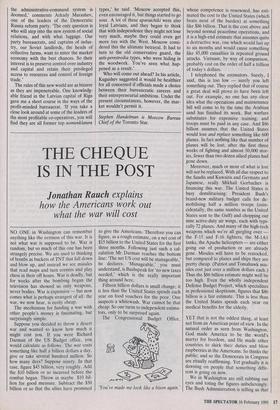EX-PARTY PRIVATEERS
Stephen Handelman on the old
apparatchiks who want to corner the new Soviet market
Moscow HE LOOKED vaguely important in his tailored Western suit. Pudgy, self- confident and sleek in the manner of rising young Soviet apparatchiks. When he slid behind a nearby table at the co-operative restaurant in Vilnius where we were din- ing, our Lithuanian friend winked slyly. 'You see that fellow,' he whispered. 'A few months ago he was one of the leaders of Komsomol [Young Communist League] in town. Now he's left the Party, runs a big business, lots of contacts with foreigners, lots of money.'
We had, of course, just seen an example of an extraordinary new mutation in Mr Mikhail Gorbachev's Soviet Union. Only a few years ago, our impeccably dressed Young Communist would have been on the first rung of the ladder to success in Soviet Politics. Mr Gorbachev himself began his own climb to the Kremlin with the coveted
post of Komsomol secretary to the Moscow university law faculty. Now that peres- troika has expanded the horizons of ambi- tious young men, what one might call the communist-capitalist entrepreneur has come into his (or her) own.
There are now enough of them around to provide a general profile of the breed. Some leave their nomenklatura positions, but just as many continue as secretaries in town councils or administrator-managers in local factories with their Party mem- bership in good order. They are not all young. A substantial number, in fact, are shrewd, frustrated veterans of a production system that punishes initiative and im- agination. Largely self-motivated, they ca- joled, compromised and made secret deals with ministries and factories while their contemporaries simply accepted without question nonsensical commands and irra- tional quotas. The early 'self-accounting'
'It's called strafing — apparently the wheels rotate faster than the frames of the film go through the shutter.' reforms of perestroika, allowing managers for the first time a choice in re-investing earnings and deciding on product lines, were directed at them, with their know- ledge of the system and how to bend it, they are perfectly placed to take advantage of plans to 'privatise' many state industries. The odd combination of businessman- bureaucrat is peculiar to a monopolistic economic system undergoing radical change. It is accepted wisdom to describe the current Soviet climate as a 'turn to the right'. The retrenchment of economic poli- cy, the re-imposition of central authority with the help of the army and KGB, and the eclipse of reformers, are all seen as evidence that Mr Gorbachev is now captive to the dark forces of conservative neo- Stalinism. But a more interesting explana- tion, hitherto largely unremarked upon by the Western press, offers the 'communist entrepreneur' as a key to the tensions.
According to one theory, the govern- ment has deliberately slowed down the transition to a market to give its allies in the bureaucracy the chance to solidify their gains. Sergei Kugushev, an economist writ- ing in Komsomolskaya Pravda, maintains that a fierce, three-way fight over the future direction of the economy is under- way, involving the old command- administrative apparatus, senior bureau- crats who are moving into the private sector, and reformers who are also trying to gain financial power. 'Because of the political instability and disorganised finan- cial system no one in the country is interested in accumulating or investing money,' he complained.
The conflict is picking up steam. Rumours fill the capital daily about bureaucrats and ministers who are moving into semi-private banks or trading firms. Meanwhile, independence-minded provin- cial governments and democratic city coun- cils are battling to open free bidding for these assets or to create their own. The Kremlin, on the grounds of eliminating 'economic chaos', issued a decree forbid- ding enterprises in republics to make their own deals with foreign firms, and it has sent the KGB and interior ministry police on harassing forays into the offices of independent businessmen. In the Baltics, the issue was settled rather abruptly by the dispatch of black-bereted interior ministry troops to buildings the Communist Party was about to lose under privatisation. For the Kremlin, the Party loyalist with one foot in the private sector, represents the last, best hope of stability.
The agonising twists and turns over economic policy in the past year begin to make sense, when you consider the rich prizes at stake: millions of roubles' worth of property, consumer goods, holiday dachas, wholesale distribution networks and newspapers, among other items which have formed the basis of the party's hidden and unaccountable wealth for decades. 'Communism is dead as an ideology, and the administrative-command system is doomed,' comments Arkady Murashev, one of the leaders of the Democratic Russia reform party. 'The only question is who will step into the new system of social relations, and with what luggage. Our party bureaucrats, and captains of indus- try, our Soviet landlords, the heads of collective farms, want to enter the market economy with the best chances. So their interest is to preserve control over industry and capital and retain their privileged access to resources and control of foreign trade.'
The rules of this new world are as bizarre as they are impenetrable. One knowledg- able friend in the Latvian capital of Riga gave me a short course in the ways of the profit-minded bureaucrat. 'If you take a close look around at some of the leaders of the most profitable co-operatives, you will find they are all former top nomenklatura types,' he said. 'Moscow accepted this, even encouraged it, but things started to go sour. A lot of these aparatchiki were also loyal Latvians, and they began to think that with independence they might not lose very much, maybe they could even get more ties with the West. Moscow consi- dered this the ultimate betrayal. It had to turn to the old conservative guard, the anti-perestroika types, who were hiding in the woodwork. You've seen what hap- pened as a result.'
Who will come out ahead? In his article, Kugushev suggested it would be healthier for all concerned if officials made a choice between their bureaucratic careers and their entrepreneurial ambitions. Under the present circumstances, however, the mar- ket wouldn't permit it.
Stephen Handelman is Moscow Bureau Chief of the Toronto Star.



















































 Previous page
Previous page